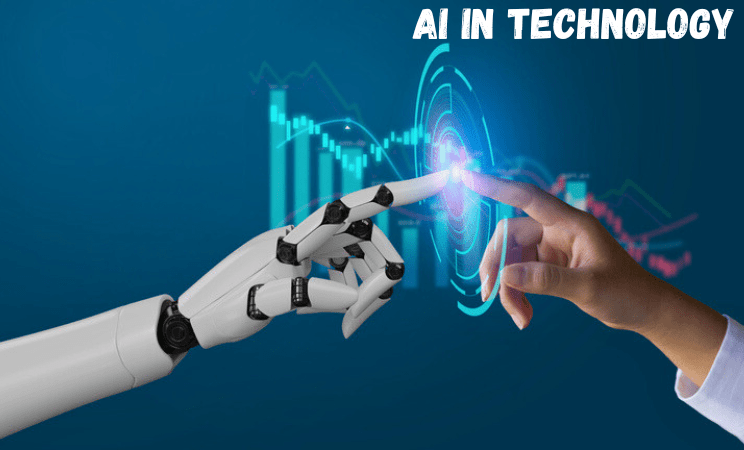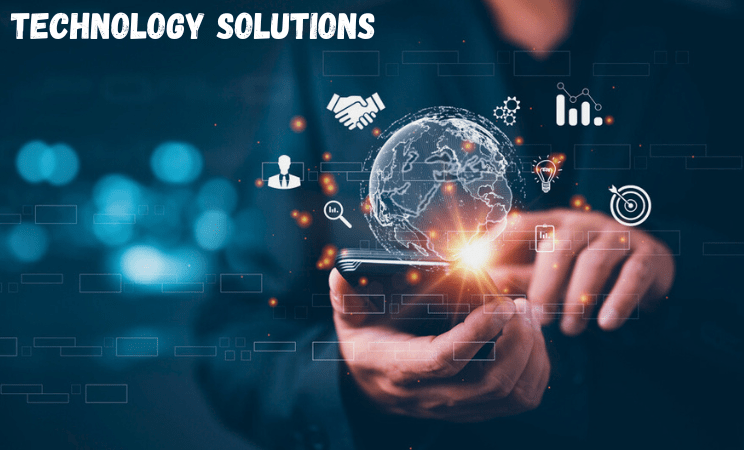AI in Technology: Harnessing the Power of Artificial Intelligence

AI in technology: AI has emerged as a transformative force in the technology world. With its ability to mimic human intelligence, AI is revolutionizing industries and reshaping the way we live and work. From self-driving cars and virtual personal assistants to healthcare and finance, the applications of AI are vast and diverse. In this article, we will explore the impact of AI on various sectors, the challenges it poses, and the ethical considerations surrounding its use. By harnessing the power of AI, we can unlock a future filled with innovation and efficiency, but it also raises important questions about the responsible use of this technology.
AI in Healthcare
Healthcare is one of the most promising applications of AI. AI-driven diagnostic tools have the potential to revolutionize the way diseases are detected and treated. Machine learning algorithms can analyze medical images, such as X-rays and MRIs, with incredible accuracy, helping doctors make faster and more precise diagnoses. AI can also predict disease outbreaks by analyzing vast amounts of data and spotting patterns that might go unnoticed by human experts.
AI-powered chatbots and virtual assistants are being used in healthcare to provide patients with information and support. They can answer medical questions, schedule appointments, and even remind patients to take their medication. As a result, patients are more engaged, and healthcare providers are less burdened.
Furthermore, AI is contributing to drug discovery and development. By analyzing chemical compounds and their interactions, AI can identify potential candidates for new drugs. This speeds up the research process and could lead to the faster development of treatments for various diseases.
While the potential benefits of AI in healthcare are immense, there are challenges to be addressed. Privacy and data security concerns are paramount when dealing with sensitive medical information. Moreover, the ethical implications of using AI to make life-and-death decisions in healthcare require careful consideration.
AI in Finance
Financial services have been early adopters of AI technologies. Machine learning algorithms are used to analyze vast amounts of financial data to make predictions about stock prices, market trends, and even customer behavior. High-frequency trading relies on AI to execute trades at speeds beyond human capability.
AI-driven chatbots and virtual assistants are also employed in the finance sector to provide customer support and facilitate online transactions. These AI systems can understand natural language, making it easier for customers to interact with banks and financial institutions.
Credit scoring is another area where AI has made a significant impact. Traditional credit scoring models are being complemented and, in some cases, replaced by AI-driven systems that take into account a wider range of data points, leading to more accurate assessments of creditworthiness.
However, the use of AI in finance is not without challenges. Concerns about algorithmic bias and the potential for financial institutions to discriminate against certain groups must be addressed. Additionally, the security of financial data is of utmost importance, as cyberattacks on financial institutions are a growing concern.
AI in Education
AI has the potential to revolutionize education by personalizing learning experiences. Adaptive learning systems use AI algorithms to tailor educational content to the individual needs of students. These systems can identify areas where a student is struggling and provide additional resources or exercises to help them improve.
Virtual tutors and language learning apps use AI to provide real-time feedback to learners, making the learning process more engaging and effective. AI can also assist teachers in administrative tasks, such as grading assignments and managing schedules, allowing them to focus more on teaching.
However, the widespread adoption of AI in education raises concerns about data privacy, as educational institutions collect vast amounts of data on students. There are also concerns about the potential for AI to exacerbate educational inequalities, as access to advanced AI-driven educational tools may not be equitable for all students.
AI in Transportation
AI is transforming the transportation industry in a significant way. Self-driving cars and autonomous vehicles are at the forefront of this change. AI-powered sensors and algorithms allow these vehicles to navigate and make decisions on the road, potentially reducing accidents and improving traffic flow.
AI is also being used in logistics and supply chain management to optimize routes, reduce fuel consumption, and enhance the efficiency of delivery services. These applications not only save time and money but also have environmental benefits.
However, the introduction of AI in transportation comes with regulatory and safety challenges. Questions about liability in the event of accidents involving self-driving vehicles need to be addressed. Moreover, cybersecurity is a critical concern, as autonomous vehicles are susceptible to hacking.
AI in Entertainment
AI is changing the face of the entertainment industry as well. Streaming services use AI algorithms to recommend content to users, increasing user engagement and retention. AI can also be used to create music, and art, and even write scripts for movies and television shows.
In the gaming industry, AI-powered characters and opponents make games more challenging and immersive. AI can also be used to generate game content dynamically, creating unique experiences for players.
Ethical considerations come into play in entertainment as well. AI-generated content raises questions about copyright and artistic originality. Additionally, there is a concern that AI may be used to manipulate media content, such as deepfake technology that can create convincing but fake videos.
Ethical Considerations
AI systems frequently operate as “black boxes,” making it impossible to understand how they arrive at their judgments. One of the most pressing ethical issues is transparency. In many cases, AI systems function as “black boxes,” making it challenging to comprehend how they make decisions. This lack of transparency raises concerns about accountability, especially in critical applications like healthcare and criminal justice.
Algorithmic bias is another ethical concern. AI systems can inherit biases present in their training data, leading to discriminatory outcomes. This is particularly problematic in areas like hiring, lending, and criminal justice, where bias can lead to unjust and harmful results.
Privacy is a fundamental concern in the age of AI. The collection and analysis of vast amounts of personal data can lead to invasive surveillance and the potential for abuse. Striking a balance between harnessing AI’s power and protecting individual privacy is a significant challenge.
Conclusion
In conclusion, the rise of Artificial Intelligence is an extraordinary milestone in the realm of technology. Its influence spans across various sectors, from healthcare and finance to education, transportation, and entertainment. The potential for positive transformation is immense, yet we must navigate the associated challenges with care. Ethical concerns regarding transparency, bias, and privacy demand our immediate attention. As we harness the power of AI, it is crucial that we strike a balance between innovation and ethics, ensuring that AI serves humanity’s best interests. The responsible and thoughtful integration of AI into our lives will shape a future where technology empowers us while preserving our fundamental rights and values. Collaboration among society, policymakers, and industry leaders will be the cornerstone of this journey toward a more equitable and promising technological landscape.
FAQs
What is Artificial Intelligence (AI)?
AI refers to the development of computer systems that can perform tasks requiring human intelligence, such as problem-solving, language understanding, and decision-making.
How is AI used in healthcare?
AI aids healthcare through diagnosis, drug discovery, and personalized treatment. Machine learning helps analyze medical images, predict outbreaks, and enhance patient care.
What are the ethical concerns surrounding AI?
Ethical issues include transparency, bias, and privacy. Ensuring fairness, accountability, and data protection are vital in AI applications.
What challenges does AI face in transportation?
Safety and regulatory concerns are critical. Self-driving vehicles must navigate liability questions, and cybersecurity is vital for protecting autonomous systems.
How does AI influence educational equity?
AI can enhance personalized learning but may exacerbate inequalities if access to advanced tools is uneven. Privacy and data security are concerns.



